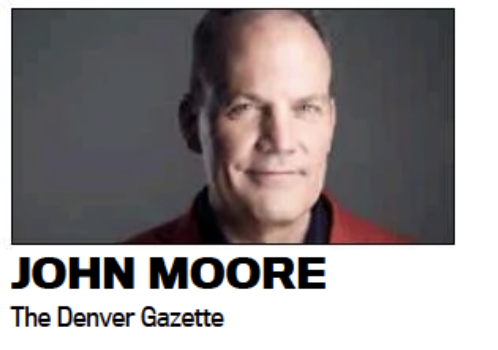
One minute, Ricardo Baca was sitting next to me at work every day in his shorts and sandals casually chatting up big-time music stars like Dave Matthews, Sheryl Crow and Keith Urban as the pop-music critic of The Denver Post. His hair was so wild, we gave it a nickname: Dragonforce.
The next, he’s on a nationally televised couch with Barbara Walters, Whoopi Goldberg and Jenny McCarthy dishing on “The View” about his new assignment as the first full-time marijuana editor at a major daily newspaper. The hair? Perfect.
“It was definitely pretty bizarre to be in New York City and having a blast doing that interview,” Baca said this week. “I shared with them that I was hiring a pot critic at the time, and Whoopi raised her hand. Next thing you know, Whoopi Goldberg was writing a column for the outlet that I had created at The Post – ‘The Cannabist.’”
Those were head-trippy times in 2013. Baca’s life was changing at warp speed. So was the newspaper industry that employed him. So was the booming weed industry in the first months after Colorado became the first state to legalize marijuana for adult recreational use. All spinning in wildly different directions.
And on hand to chronicle all of it was Denver filmmaker Mitch Dickman, whose 2015 documentary “Rolling Papers” has become a rollicking time capsule of both the marijuana and newspaper industries. Both are nearly unrecognizable just a decade later.
At ground zero of the green rush, The Denver Post became the first major media outlet to appoint a marijuana editor. Policy news, strain reviews, parenting advice and edible recipes are the new norm in the unprecedented world of pot journalism.
Colorado has sold about $12 billion of recreational marijuana since 2013, according to the Colorado Department of Revenue. But recreational pot is now legal in nearly half of all states. Last year, sales in Colorado plummeted 40 percent from 2021. Retail prices and applications for marijuana business licenses are also on the decline. Colorado is not so special anymore.
But there was a time when all eyes were on Colorado and Baca. Including Dickman’s.

Denver filmmaker Mitch Dickman of Listen Productions at the 2023 Denver Film Festival. He is the director of the documentary "Rolling Papers."
“I think ‘Rolling Papers’ captures an interesting moment in time that will never happen again – and it’s a lot of fun to watch,” said Dickman. “We were flying by the seat of our pants making a film that you had to make when we made it – or it was gone. You can't go out and make that film today, so that feels pretty cool.”
The “Rolling Papers” creative team is taking a moment on Saturday, as the Doobie Brothers might say, to go “reeling” in the years. They will present a cannily timed, one-time-only 10-year retrospective screening of “Rolling Papers” at 4:20 p.m. on 4/20 (aka Saturday) at the Sie Film Center. A free-form panel conversation will precede the screening.
“It should be a total blast,” Baca said.

A screenshot from the 2015 documentary "Rolling Papers."
From the start, Dickman said, the filmmaking plan was not to dictate a storyline that the filmmakers had no possible control over. Dickman simply committed to following Baca for a year – 2014. No one knew what they would find or what the world was going to look like when they were done. They could only report what they saw.
“It's crazy to think that 10 years ago, Mitch and the gang were following me and my colleagues around with film cameras, not only around the state of Colorado but down into Uruguay where I was reporting on the first country in the world to ever legalize cannabis,” Baca said.
The documentary was an immediate sensation when it launched at the South by Southwest Film Festival in Austin, Texas.

Former Denver Post Editor Greg Moore assigned Ricardo Baca to be the first dedicated marijuana reporter at a major daily newspaper.
“We sold the film on the night of the world premiere, which was pretty crazy, and it ended up playing in 35 markets,” Baca said. Netflix held the streaming rights for five years.
In the words of Los Angeles Times critic Michael Rechtshaffen, “‘Rolling Papers’ functions as both a handy pot primer and a telling portrait of the volatile, adapt-or-die climate that continues to hover over the newspaper industry.”
And about that sad industry: According to the Pew Research Center, U.S. newsroom employment fell 26% from 2008-20. At its peak, the Denver Post newsroom employed about 300 journalists. In 2018, it cut another 30 jobs, which by then represented one-third of the remaining newsroom. The Sunday circulation peaked at about 750,000 in the mid 2000s. Its daily print circulation is now about 57,000.
I took my buyout in 2011. Baca resigned in 2016. Today, he is the founder and CEO of Grasslands, a journalism-minded PR and marketing agency working with wellness brands including food, beverage, cannabis and psychedelics.
“It's been painful to watch what's been happening in traditional media, but it's only a continuation of what I watched from the inside for 24 years,” Baca said. “But I'm still rooting on all of my colleagues in Colorado media and supporting the work that they do via subscriptions and memberships and Patreons and sponsorships and advertising, and I hope that other Coloradans and Colorado business owners do the same.”
The cannabis industry, Baca said, has had multiple life cycles since the release of “Rolling Papers” in 2015.
“Like any brand-new market, we've seen booms and we've seen busts, but we've seen more booms, and we will continue to see more as this industry finds its corrected market,” he said. “Back in the days of ‘Rolling Papers,’ the cannabis industry was blowing up with insane valuations – but those are a lot more realistic and rooted in reality now.”
Baca believes the state of the cannabis industry in Colorado “is healthier now than it was six months ago,” he said. “But I don't know that we've found our bottom yet. And until we do, and we find what our actual market looks like in this new era of increasingly legal weed in other states, then we'll continue to see some pain in the market.”
Just today, though, a promising new statewide survey by Public Policy Polling shows just how much Coloradans’ outlook on weed has been changed by a decade of legalized marijuana. Seven out of 10 voters (71%) now think marijuana should be a legal product for adults. Two out of three (67%) see the sale and taxing of marijuana as a good thing. And 56% believe Colorado’s regulated marijuana industry has had a positive impact on the state economy.
Baca is not surprised, especially in the context of “Rolling Papers” and how much weed has changed journalism as well.
“I love that our film chronicled such a bizarre time in history where American journalism pivoted from covering weed as the supposed gateway drug to covering cannabis as the efficacious medicine and delightful recreational substance that it is,” Baca said.
It can’t be overstated how much Baca’s life has changed over the past 10 years – notably, he’s now the boss of 24 Grasslands employees. Which is one reason Saturday’s screening will be like home-movie night for his office team.
“It's been strange having new colleagues at Grasslands and also new clients and friends who have never been able to see this movie,” Baca said. “Now, they can.”
And so can you.

A screenshot from the 2015 documentary "Rolling Papers."















(0) comments
Welcome to the discussion.
Log In
Keep it Clean. Please avoid obscene, vulgar, lewd, racist or sexually-oriented language.
PLEASE TURN OFF YOUR CAPS LOCK.
Don't Threaten. Threats of harming another person will not be tolerated.
Be Truthful. Don't knowingly lie about anyone or anything.
Be Nice. No racism, sexism or any sort of -ism that is degrading to another person.
Be Proactive. Use the 'Report' link on each comment to let us know of abusive posts.
Share with Us. We'd love to hear eyewitness accounts, the history behind an article.